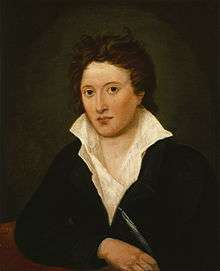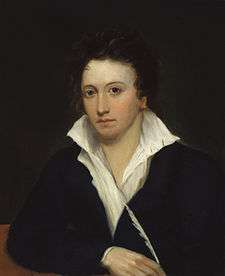Love's Philosophy

"Love's Philosophy" is a poem by Percy Bysshe Shelley published in 1819.
Background
The poem was published by Leigh Hunt in the December 22, 1819 issue of The Indicator and reprinted in Posthumous Poems in 1824 edited by Mary Shelley.[1] It was included in the Harvard manuscript book where it is headed "An Anacreontic", dated "January, 1820". Anacreontics are poems written in the style of the ancient Greek poet Anacreon, known for his celebrations of love. Shelley wrote it in a copy of Leigh Hunt's Literary Pocket-Book, 1819, which was presented to Sophia Stacey, December 29, 1820.
The poem is divided in two 8-line stanzas with an ABABCDCD rhyme scheme.[2]
The main theme is that of the "connection" that exists between all things in the world in general and between the poet and his object of affection in particular. There is unity in nature. This unity is also found in human relationships and interactions.
The poetic devices Shelley uses in the poem include Personification (Fountains mingle with the river; Winds of heaven mix forever with a sweet emotion; The mountains kiss high heaven; The waves clasp one another; Moonbeams kiss the sea), Metaphor (No sister flower could be forgiven if it disdained its brother), and the Rhetorical question (If thou kiss not me?).
Original text
| Wikisource has original text related to this article: |

The fountains mingle with the river,
And the rivers with the ocean;
The winds of heaven mix forever
With a sweet emotion;
Nothing in the world is single;
All things by a law divine
In another's being mingle-
Why not I with thine?
See, the mountains kiss high heaven,
And the waves clasp one another;
No sister flower could be forgiven
If it disdained its brother;
And the sunlight clasps the earth,
And the moonbeams kiss the sea; -
What are all these kissings worth, or What is all this sweet work worth
If thou kiss not me?
In Popular Culture
British composer Roger Quilter set the poem to music in 1905 in the composition Love's Philosophy, Op. 3, No 1.
In 2003, David Gompper set the poem to music in a score for baritone and piano.[3]
The second stanza of the poem appears in the second season of Twin Peaks.
References
- ↑ Hutchinson, Thomas, ed. The Complete Poetical Works of Percy Bysshe Shelley. London: Oxford University Press, 1909, page 578.
- ↑ Shelley, Percy Bysshe. The Selected Poetry and Prose of Shelley. Ware, Hertfordshire, UK: The Wordsworth Poetry Library, 2002.
- ↑ Composer David Gompper.
Sources
- Bonca, Teddi Chichester. Shelley's Mirrors of Love: Narcissism, Sacrifice, and Sorority. Albany: State University of New York Press, 1999.
- Shelley, Percy Bysshe. The Selected Poetry and Prose of Shelley. Ware, Hertfordshire, UK: The Wordsworth Poetry Library, 2002.
- Shelley, Percy Bysshe. The Complete Poems of Percy Bysshe Shelley. New York: The Modern Library, 1994.
